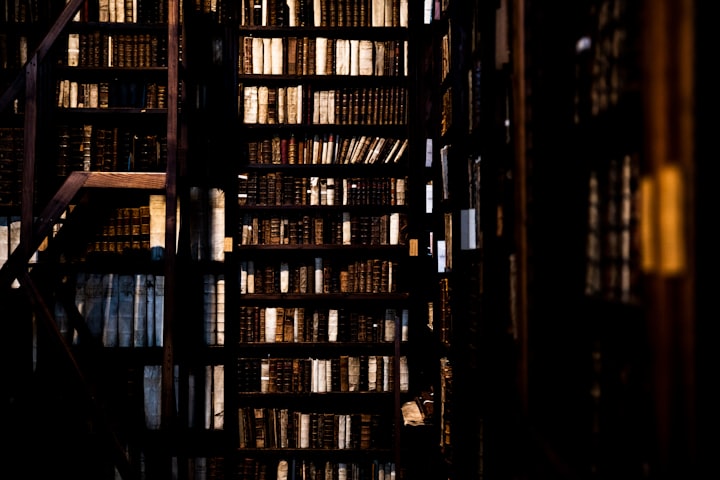Ten Reasons Why Literature Is Better Than Music
A Fair Argument...?

1. Formats
It is very easy to sit back and open up an old paperback or a hardcover book and enjoy it. It is not so easy to do the same with old technology. It demands constant updating. To wear an old orange-foam headset plugged into an original tape-only Sony Walkman and expect to be treated fairly in a world of iPods and various other shrunken portable devices is a sad dream. The humiliation of not being up to date with your technology is immediate and palpable.
2. Engagement
This may be a little tricky to explain without an example:
We have all heard of child prodigies. According to the official story, Mozart was such a prodigy. He was also very annoying company and tolerated only as long as his music was fashionable (in his lifetime, this was very brief). He had sponsors at court and only had to worry about money near the end of his life. And his music still lives.
Now, how many writing prodigies have you heard of (children who can produce a brilliant novel before they have succumbed to puberty)? There are none that I can name – none on any school syllabus that I can remember – and I think I know why: literature requires the experience of living in the world and commenting on the society one is in. The best writers always do this no matter where they find themselves. Musicians are not obligated to do this. They create melodies that linger in the head and can be easily recalled or interchanged with another song. Writers have the more difficult task of engagement and understanding what they have been given.
3. Reverence
I will admit that I enjoy looking at old vinyl album covers. They are just the right size to be considered a kind of framed art work (a painting to accompany the sounds you just purchased). But the vinyl format is now just for collectors, hipsters and DJs. We now want CDs – sometimes – and downloads.
Now, head over to an antiquarian specializing in old books. Try not to feel any sense of awe in handling or even gazing up at a book from several decades or a century ago. I was once employed to handle rare books kept in storage at the central branch of my hometown’s library. I still feel honoured to have been entrusted to catalogue records of the city’s history and tracts from early pioneers and founders of the town. I never felt that way skimming through my uncle’s selection of dance music from the 1960s.
4. Books on Tape (or CD)
The title of this section just proves my point. Why did companies feel the need to move one format onto another format? It began with records; for convenience, it moved onto audio tapes. There are now books recited on CDs.
Music companies do not feel the need to do this. Musicians read scores; fans of certain musical icons can read about their favourite stars in magazines and books. There is not much demand to read a phonetic transcription of the symphonic work of Beethoven. The interest only works in one direction. Books on tape or CD prove that even if someone does not want to open a book, they still want a story.
5. Imagination
This one is also debatable. Music does open up certain sensations and certain feelings in the mind and/or soul. But not much effort is needed to feel moved by a melody. For some, Beethoven’s 9th symphony is a moving experience that transcends all others. For another clique, the creative output of the latest pop star grinding through another pop hit is their reason for listening to music.
A book demands certain things that make it inconvenient: you have to invest time in it; you have to follow and understand the plot, characters, setting, themes, etc.; and you have to come to your own conclusions after you are done. It stimulates the imagination to do more than just remain a passive witness to the art. Music makes none of these demands, and – like television or a movie – you can step away from it and not truly think about the experience. This is much harder to do after reading Tolstoy’s masterpieces or a Shakespeare tragedy.
6. Physical Damage
I will return to Beethoven: He went deaf. This is one of the worst cosmic jokes in the history of music. And there is the other problem of how we listen to music today. There have been many warnings about how loud we listen to music in night clubs and on portable devices. A report a year ago noted the damage caused to the hearing of teenagers just from the mp3 format itself. This does make me wonder if I should get into a sound competition with the noises around me when I try to write with a headset on in a café.
There is not much call to get people to stop reading to save their eyesight. And yes, for those of you who know about the lives of writers, John Milton and James Joyce were two casualties to poor vision (Milton recited part of Paradise Lost while blind; Joyce was reduced to writing one large word per page to complete his last book). But note that both men could still experience their work while losing a key sense related to that work. Beethoven’s suffering was far more extreme. And he never owned an iPod.
7. Tangibility
This is exaggerating, perhaps, but it is a different experience to hold a book in one’s hands than it is to hold a CD. There is the sense of something precious about a book read and cherished. You want to hold on to it (the edition, the shape, the cover – they remain unique and unchangeable); you want to keep what you know. I never felt that way when I downloaded music to my drive, or transferred CDs to my memory cards.
We like to hold onto books; music is slipping away from our grasp every year.
8. Perception
Step onto a bus, train or subway and look for the people listening to music. Now, when you have spotted them, and they have not yet asked you to leave them alone, try and guess what they are listening to; you may actually hear what they have on (see section on “Physical Damage”). Depending on the subject’s age, sex, colour and grooming habits, you may be able to neatly categorize them under different types of popular music (w. perhaps a few allowances for jazz and classical music).
Take that same locale and check out the readers: that man in a business suit reading Dickens; the woman beside in a nurse’s outfit with a classic of Victorian literature; the young woman with the heavy novel written by someone you have never heard of. What have you learned about them? With music, immediate prejudices come out; books – depending on their covers (yes, they sometimes matter) – will require a little bit of thought. This may help you get through the commute, despite the irritation of the noise from the mp3 of the man next to you who is obviously infatuated with electronic dance music.
9. Books Made into Films
Much like my comments about books on tape, many books make an easy transfer to a visual medium: Jaws, The Godfather, The Reader, A Clockwork Orange, and Donnie Brasco. These books were received with different levels of praise and are still admired and dismissed today. But they are also unforgettable because of the films they inspired and many readers now cite them as the reason why they have any sort of information about the books. This can be accepted. Reading, for example, A Clockwork Orange and then watching it on film provide two very different rewards, one visual and aural, the other linguistic and dramatic. The interchange of mediums is a success.
Music on film? Only experimental films seem to work well with music (cf. Thirty-Two Short Films about Glenn Gould). Music is in the background in films; and although they may add to the vision of a director, they cannot replace it (this may be the reason why most soundtracks for most films are forgettable creations). When a director makes a supreme effort to get the musical process on film, you end up with the work of Ken Russell, an unpleasant result for audience and music lover alike (cf. The Music Lovers). As proven by this and other musical biographies, there is no need to see the life if we have the music. There is even less need to recreate – or at least attempt to recreate – the means by which the music was created. Not everyone is familiar with the strange life of Jean Sibelius, but his music can still move them. The visual medium of film cannot add to another medium that exists to disappear and remain a lingering element in the mind. The clash is inevitable.
10. Personal Prejudice
Just accept it: we all have our biases and beliefs about each other, whether they are cultural, sexual, and racial and so on. What about our musical hang-ups? Head back to that bus, metro or train and find the groups of people who belong to their own particular clique. A part of that clique will be formed via the sounds they enjoy. A Goth pair listening to the latest from Marilyn Manson or Tool may not be so interested in making friends with the pair of girls gossiping about their favourite Jonas Brother. Music does segregate, moving into listening devices, clothing, and opinions about that other group.
Now, this does not happen with bookworms. I have never seen a Stephen King fan shunned by a book-loving group devoted to Peter Straub. Harry Potter fans can understand and perhaps even enjoy the work of J.R.R. Tolkien. And Thomas Harris fans have a lot to discuss with devotees of Dashiell Hammett and Raymond Chandler (although the latter may not appreciate all the gore).
Yes, I am not playing fair with this last argument. I have not placed Stephen King next to Tolstoy, or Mr Harris on a list with the work of Walter Benjamin. There are readers for many of the former in those pairs who may never touch the latter, and vice versa. But I have never felt excluded from the low and high in my choice of books. We all start with comic strips and books; we have the standard classics of children’s literature; and we may enjoy pulp and romance books. But all of this varied reading forms a whole that allows a lover of books to think openly and wisely. Biases may form, but they can be overcome by acknowledging our original sources of enchantment.
*
Thank you for reading!
If you liked this, you can add your Insights, Comment, leave a Heart, Tip, Pledge, or Subscribe. I will appreciate any support you have shown for my work.
You can find more poems, stories, and articles by Kendall Defoe on my Vocal profile. I complain, argue, provoke and create...just like everybody else.
Give it a look...
About the Creator
Kendall Defoe
Teacher, reader, writer, dreamer... I am a college instructor who cannot stop letting his thoughts end up on the page.
And I did this: Buy Me A Coffee... And I did this:






Comments
There are no comments for this story
Be the first to respond and start the conversation.